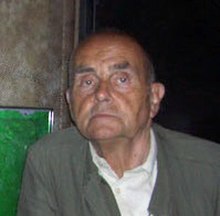Hans-Joachim Roedelius
| Hans-Joachim Roedelius | |
|---|---|

Hans-Joachim Roedelius in 2007
|
|
| Background information | |
| Born | 26 October 1934 |
| Origin | Berlin, Germany |
| Genres | Avant-garde, krautrock, industrial, electronic, synthpop, Oblique Strategies, ambient, psychedelic rock, electronic, experimental, new-age, German rock |
| Occupation(s) | Musician, producer |
| Instruments | Synthesizer, keyboards, piano, guitar |
| Years active | 1968 – present |
| Labels |
Bureau-B Sky Records Egg Records Barclay Records Multimood Editions E'G All Saints Prudence Klanggalerie Rykodisc Gyroscope Polygram Curious Music Amadeo Captain Trip Records, Grönland Records Nepenthe Music Fabrique Records Psychonavigation Records |
| Associated acts |
Cluster Harmonia Aquarello Kluster Human Being Qluster |
| Website | roedelius |
Hans-Joachim Roedelius (born 26 October 1934 in Berlin) is a German experimental, ambient and electronic musician. He is best known as a co-founder of the krautrock groups Cluster and Harmonia and for his work in the ambient jazz trio Aquarello.
As a child he acted in UFA films such as "Verklungene Melodie" (Dead Melody, 1938), "Es leuchten die Sterne" etc.. He was an unwilling member of the Hitler Youth, for the youngest called 'Pimpfen'.
In 1968 Roedelius co-founded the music commune known as "Human Being" and co-formed Zodiak Free Arts Lab, the center of Berlin's Underground Culture at the time, with conceptual artist Conrad Schnitzler. He met Dieter Moebius at the Zodiak. In 1970 Roedelius, Schnitzler and Moebius formed Kluster. In 1971 Schnitzler left the group to start a long-running solo career and Moebius and Roedelius anglicised the band's name to Cluster. At first Cluster worked along the same lines as their parent group, signed first to Philips then to Brain.
In 1973 Roedelius and Moebius worked with Neu! guitarist Michael Rother for the first time. Rother helped to co-produce their third album, Zuckerzeit, that moved the band's style further from avant-garde 'noise' to a more melodic music, similar to modern-day trance. Roedelius, Moebius and Rother toured Germany and the Low Countries as a trio from early 1973 and decided to record an album together under the name of Harmonia. Musik Von Harmonia was released on the back of a huge publicity campaign by Brain. Harmonia released one further album initially, 1975's Deluxe. British musician Brian Eno, a fan of both Cluster and Harmonia, joined them for several jams, the result of which was released in 1997 as Tracks & Traces. Rother left Harmonia to pursue his solo career and Cluster returned to the studio to record Sowiesoso which was released on Sky Records. Brian Eno, who had returned to Germany to work with David Bowie, worked on two albums with Cluster: 1977's Cluster & Eno and 1978's After the Heat, the latter of which gained the band much attention in the British music press. A further Cluster album produced by former Tangerine Dream member Peter Baumann Großes Wasser extended Cluster's music into long form.
...
Wikipedia
